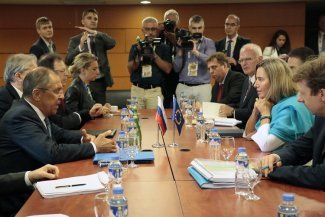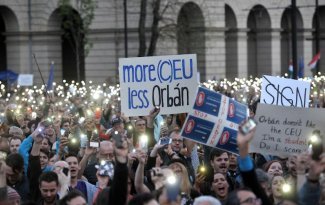Unveiled in 2014, this controversial monument commemorates the Nazi occupation of Hungary during World War II. Critics, who regularly deposit personal belongings, documents of people deported to concentration camps and stones in front of the monument, argue that the statue’s design whitewashes Hungary’s role in the Holocaust.
In 2014 an allegorical monument commemorating the German occupation of Hungary during World War II was erected in central Budapest. The statue depicts “innocent Hungary” as the Archangel Gabriel being attacked by a bronze eagle with sharp talons representing Nazi Germany. Critics of the controversial statue claim that it obscures Hungary’s role in the deaths of tens of thousands of Hungarian Jews. The monument was inaugurated during a period that saw Prime Minister Viktor Orbán’s ruling nationalist party Fidesz radically shift its foreign policy away from a pro-European stance and firmly into the Kremlin’s orbit. Its primary motivations in doing so were both economic and ideological.
“Traditionally, Hungarian nationalism has always looked towards Europe, especially Germany, while it used to see Russia as a barbaric power. That’s why the fact that Orbán preferred Putin as an ally rather than Merkel was a big surprise,” Hungarian historian Ferenc Laczo tells Equal Times. Hungary’s relations with Moscow soured in particular after the 1956 Soviet invasion, in which the USSR brutally repressed the Hungarian Uprising and put an end to the attempted reforms advocated by the leadership of Hungary’s communist party.
Although Orbán had ruled the country with a supermajority since 2010, his shift in geopolitical alliances first took place in 2014, when he signed a series of cooperation agreements with Moscow. These included an expansion of the Paks nuclear power plant, a project valued at €12.5 billion (around US$16 billion in late 2014). Since then, Orbán and Putin have seen each other regularly, and Hungarian foreign minister Péter Szijjarto even received the Russian Order of Friendship medal last December.
While the war in Ukraine has created tension between Moscow and Budapest, it does not appear to have damaged their relations.
With Hungary’s 3 April general elections approaching, Orbán deftly changed course after the hostilities in Ukraine began, distancing himself from Putin and adopting a position of calculated ambiguity, which he defines as “neutrality.” While he supported Brussels’ initial sanctions against Russia and welcomed Ukrainian refugees, he has refused to arm Kiev or even to let Western arms shipments pass through Hungarian territory. Moreover, he baselessly accused the opposition of trying to drag the country into war with Russia.
His strategy worked perfectly: he not only retained his supermajority – more than two-thirds of the parliament – for a fourth time but also increased his lead over the opposition, which attributed the election results to the government’s overwhelming dominance of the media. In Vamoszabadi, a village of some 2,000 inhabitants located on the Slovakian border, Orbán’s message resonated: “It’s horrible what is happening to the Ukrainians and we have to help them. But we can’t get involved in the war. That’s why I’m voting for Orbán,” said Bea, a shop assistant in the village’s only grocery store, before heading to the polls.
Energy dependence on Russia
According to experts, Orbán’s geopolitical realignment is motivated by two factors: ideology and energy interests. Laczo describes Orbán as a chameleon adept at reading the shifting political winds. A liberal in the 1990s, he became a Christian Democrat a decade later, before ultimately embracing a markedly eurosceptic far-right populism following his 2010 victory. “It was his reaction to the hard economic crisis in 2008. The liberal order lost credibility in Hungary. There was also a big disappointment among Hungarians with respect to the expected gains of EU integration. He built his project based on this new reality,” says Laczo.
Viewed through an ideological lens, an alliance with Putin seems a natural fit for this latest version of Orbán. The European right admires Putin for his defence of traditional values and patriarchy, his hostility towards gay rights and multiculturalism, and his harassment of Islamist movements in Syria. The Russian leader had also actively encouraged the emergence of far-right groups, either by promoting them through his international media outlets, such as Russia Today or Sputnik; or by directly financing their campaigns. Brexit in the UK and the election of Donald Trump in the US convinced Orbán that he was on the right side of history.
Viktor Orbán claims that his pivot toward Moscow has led to a reduction in the cost of electricity and gas for the Hungarian public.
In February, Putin claimed that Hungary was paying one-fifth of the international market price for its natural gas imports. However, some Hungarian media outlets disputed this figure, reporting that Budapest was actually paying the market price. “The terms of the agreement are not public, so we can’t know for sure. But all indications are that Hungary simply pays market prices with a delay of a few months,” says energy analyst Martin Jirusek. If citizens’ bills are cheaper, he explains, it must be due to state subsidies.
Whatever the case may be, Orbán’s gamble has led to a huge energy dependence on Russia. “Hungary buys almost all its gas from Russia, which represents 40 per cent of its energy mix. But it is not the only European country [with a similar figure]. Where its hands are really tied is in the nuclear sector,” adds Jirusek. While the decision to entrust all energy policy to Moscow may have seemed profitable in the short term, as Jirusek explains, being so dependent on a single country has already proven risky. European institutions were wary of the agreement with the Russian state-owned company Rosatom from the outset, as there was not even a public tender.
Hungary’s alliance with Putin, who for years has been trying to destabilise Western democracies with cyberattacks and disinformation campaigns, has deepened the existing rifts between Brussels and Budapest over the Orbán government’s violations of democratic principles such as judicial independence. However, since the start of the war, Hungary has never been completely alone in opposing measures to rein in Moscow. Other countries, such as Malta or Cyprus, have refused to send arms to Ukraine.
While EU member countries such as Germany and Italy, which are highly dependent on Moscow for their energy, initially resisted the most onerous sanctions, revelations of atrocities committed against Ukrainian civilians and pressure from the Baltic countries have led them to change their positions.
While several countries still oppose the embargo on Russian natural gas, Hungary is the only remaining country outright blocking the Russian oil embargo. “Unanimity is required for these foreign policy decisions. Hungary can block decisions on its own,” says Pol Morillas, director of the CIDOB think tank. “One card Orbán could play is to make a change in his position conditional on ending all economic sanctions [for violating the rule of law]. This would represent a dilemma for the EU: finance Orbán or give up on European unity against Russia?”
Orbán has thus far not opted to employ this negotiating strategy, instead demanding that Budapest be financially compensated for giving up Russian oil, which accounts for 65 per cent of its oil consumption.
Hungary’s foreign minister Szijjarto puts the necessary investment at between €15 and €18 billion (US$18.7 and US$22.5 billion), though, as Reuters reports, his short-term requests are more modest. In addition, Hungary, along with the Czech Republic and Slovakia, would benefit from an extension of the embargo, which would begin at the end of this year for the other countries. According to the Commission, ending energy dependence on Russia will be very costly for the EU-27, requiring investments worth €210 billion (US$262 billion) over the next decade.
In a sign of tensions between Brussels and Budapest, the EU has yet to approve Hungary’s post-Covid recovery package. In addition, the European Commission in April initiated an unprecedented disciplinary procedure to block regular funds to Budapest for violating the rule of law. It is estimated that the sanctions could amount to some €40 billion (around US$50 billion). With Orbán emboldened by his election victory, observers anticipate a train wreck ahead. In fact, last Tuesday, Orbán amended the country’s constitution and declared a state of emergency, a measure that will allow him to rule by decree.
Until recently, Orbán could count on the backing of Poland, which is embroiled in similar conflicts with Brussels, to block any EU sanctions. However, the eurosceptic Warsaw-Budapest axis is experiencing a serious crisis due to the countries’ opposing positions on the war in Ukraine. “Internally, Orbán has been strengthened, but internationally he is more isolated than ever,” says Morillas. The prime minister’s last bastion of international support appears to be the right wing of the US Republican Party, which held an international convention in Budapest on 20 May. It remains to be seen whether Orbán will give in to Brussels or stick to his guns in the hopes that an ally will soon return to the White House.













